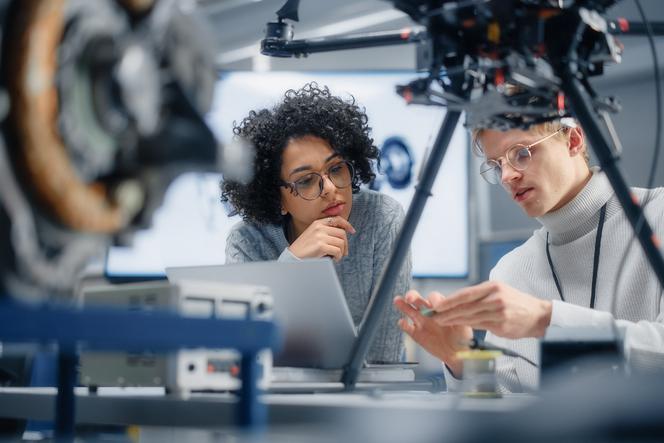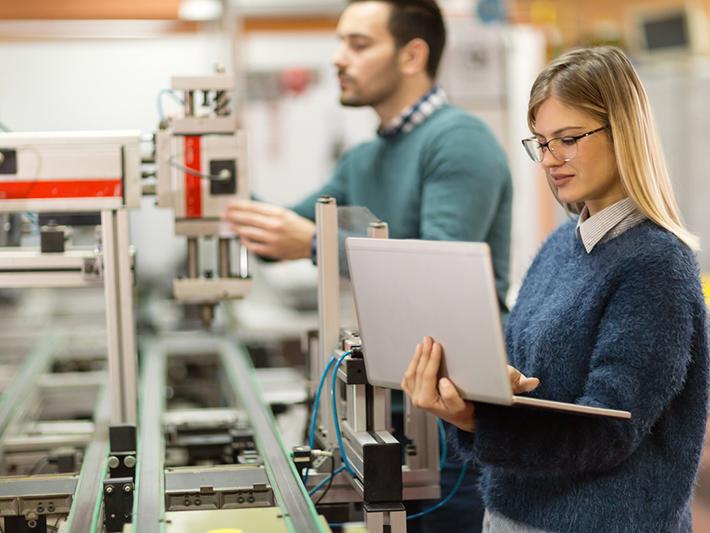Academia and industry need each other. Universities provide the blue-sky and applied research – and nurture the talent pool – that will shape the future, while industry partners, from manufacturing to the creative arts, help realise the economic and societal impact of knowledge and innovation. As government funding wanes and demand for graduates who are as agile as the sectors they will enter rises, universities are increasingly reliant on this symbiosis. Industry-university partnerships – whether project-based, spin-outs or place-based – anchor regional growth and have the power to address global challenges such as climate change and inequality. This collection offers advice from around the world on how to build such collaborations for mutual benefit and better outcomes.
Starting with how to choose the right industry partners as explained here by Andy Colley of Birkbeck, University of London.
Harness academic-industry partnership to drive innovation
By working together, an academic team and a business can be more than the sum of their parts. But there are natural tensions between the educational and research focus of a university and the commercial imperatives of industry. Writing from varied vantage points, these academics offer advice on how the university-industry relationship should be shaped.
What does the UK’s spin-out ecosystem need to thrive nationwide? Despite their abundance of research and expertise, UK academic institutions lack mechanisms to encourage and incentivise movement between academia and industry, particularly within the spin-out community, writes Richard Hague of the University of Nottingham.
Bridge the gap between knowledge and solutions with industry partnerships: Academic and industry partnerships can help both sides achieve more than they could alone. Here David Parker of Hong Kong Baptist University explains how to build a relationship for long-lasting collaboration.
Should universities meet all industry demands? With higher education institutions adapting their programmes to prepare students for future jobs, they risk producing corporatised graduates to a detriment of innovation or even business’ best interests, writes École Polytechnique’s Stéphane Bouchonnet.
The alchemy of promoting partnerships between higher education and industry: With the promise of technological innovation and demand for talent, universities and industry have much to gain by working together. Brandy Salmon of Virginia Tech shares advice for developing sustainable, impactful industry collaboration.
Models for sharing ideas across sectors and borders
In crucial fields such as semiconductors, universities can work with industry to streamline and accelerate progress and generate real-world impact. But knowledge exchange in one area can also provide a model for collaboration in other regions and disciplines, as these articles explain.
Connect and catalyse - international collaborations in the semiconductor field: Semiconductors are essential for modern electronic devices, AI hardware and economic efficiency and growth. How can we catalyse continued progress and innovation in this field? International collaborations are key, as Cindy Yi of Virginia Tech explains.
How knowledge-sharing is making Baja’s wine industry the ‘next Napa’: Diana Celaya Tentori of CETYS Universidad discusses the huge benefits of knowledge-sharing in wine research that can be applied to every academic discipline
How to ensure the benefits of academic-industry partnerships are mutual
The key to any successful collaboration is shared benefit. In the case of academic-industry partnerships, positive impacts can reach far beyond the parties directly involved. But this is not a given, and projects must be carefully designed and managed to ensure any gains are fairly distributed. These resources explore different ways of building mutually advantageous initiatives.
How to work with industry in mutually beneficial ways: Collaboration through professional societies offers students real-world learning opportunities and universities a way to enhance graduate employability. Ali Zwain of Al-Mustaqbal University explains how to do it.
How to collaborate successfully with big business: Tanya Wood of King’s College London shares lessons for university teams on working with corporate business to deliver mutually beneficial projects.
The power of short courses in transforming the workplace: What started out as a business research project into low productivity became a commercially successful short course. Perhaps, writes Richard Saundry of the University of Westminster, it’s time to think outside the box and respond to what businesses need.
How to make enterprise activities enjoyable and impactful: Incorporating knowledge exchange and enterprise activities into demanding academic schedules can be a challenge but it doesn’t have to be stressful. Larisa Yarovaya and Jeni Giambona of the University of Southampton share ways to make it enjoyable, rewarding and impactful.
Industry-university partnerships to support regional growth
Clusters that bring together business, higher education institutions and industry-based expertise can underpin and capitalise on a region or country’s strengths, laying fertile ground for enterprise, attracting talented students and faculty, and keeping them there with career opportunities. The resulting economic growth and investment can bring far-reaching benefits to an area, as described here.
The power of partnerships in preventing regional talent drain: How one university collaborated with another institution and local employers to address region-specific skills gaps and retain graduates locally – plus advice for others looking to do the same, from Hanna Hopkinson of Nottingham Trent University.
How Indian universities can address the country’s talent crisis: Higher education’s role in preparing students for real-world jobs includes forging strong industry partnerships, establishing pathways into apprenticeships and fostering creativity, write Raul Villamarin Rodriguez and Hemachandran K of Woxsen University.
Drive impact beyond the university campus
Working with industry is an effective way to move discovery from the lab or study into the real world. These resources explain how research teams can partner with businesses in ways that use and apply their findings and academic knowledge so the impact reaches far beyond the walls of a university.
Collaboration is a quiet evolution for bold impact: How can universities drive global progress through creative collaboration with private sector partners? Brandy Salmon of Virginia Tech shares lessons for university leaders.
Supporting pathways for nurses into clinical research: Organisational support for clinician researchers is an effective way to ensure that healthcare research is translated into clinical practice. Natasha Roberts of the University of Queensland explains how a partnership between an Australian university and a local health service aims to amplify impact.
Building blocks of university-industry partnerships for positive change: How universities can develop strategic cross-sector partnerships and trans-disciplinary research in order to boost progress towards the SDGs, by Tim Bodley-Scott and Ersel Oymak of UCL.
How universities can build meaningful collaborations to solve societal challenges: For universities to extend their impact and community engagement, they need to form strong partnerships with external organisations and individuals. Alicia Wilson of Johns Hopkins University shares seven guiding principles that support successful collaboration.
How students benefit from effective industry collaboration
Hands-on, real-world experience for students is just one of the benefits of industry-university partnerships focused on education. They can also provide insight from sector experts and prompt students to consider questions around ethics and responsible innovation, as these articles make clear.
Cultivating a responsible innovation mindset among future tech leaders: The classroom is a perfect place to discuss the messy, real-world consequences of technological discoveries, writes Andreas Alexiou of the University of Southampton. Beyond ‘How?’, students should be asking ‘Should we…?’ and ‘What if…?’ questions around ethics and responsibility.
How partnerships with business are evolving to support student employability: ‘Intrapreneurship’, interdisciplinary degree pathways, student-led projects and early engagement are all ways universities can move industry collaboration from partnership to co-building, writes Saurabh Sinha of the University of Canterbury | Te Whare Wānanga o Waitaha.
Five ways to connect PhD students with industry: Developing industry experience is often the last thing on the minds of the PhD community, but nurturing partnerships between academia and industry can enrich the journey, believes Maria-Christina Vogkli of the London School of Economics and Political Science.
A guide to building lasting partnerships between students and industry: How can universities bridge the gap between students and their future employers? Bring real value to both sides with these tips by Amy Pyle and Dan Robinson of Loughborough University.
Build a practitioner community to embed industry experience into your courses: Bringing industry professionals into your teaching roster brings a multitude of benefits. Lesley Pender of the University of Strathclyde shares insights on building a community of teacher-practitioners.
What support students need to succeed in work placements: Students in work-based learning placements need support before, through and when returning from their experience. Here is advice for universities and academic tutors to maximise the benefits of the opportunity for all, from Saheda Begum and Zoë Allman of De Montfort University.
Manage work-integrated learning and apprenticeships
Apprenticeships and work placements must be designed to work for both student and employers. Here, experts share insights on designing systems that ensure students can access work experience and employers benefit from a ready pool of talented young trainees.
Graduate apprenticeship students are facing a perfect mental health storm: Graduate apprenticeships are booming, but the pressure of holding a full-time job while working towards a degree can take a toll on apprentices’ mental health. Gary Gillon and Alan MacDonald of the University of the West of Scotland explain what universities and employers can do.
Tips for successful apprenticeships courses: Learn how to please both the learner and employer when setting up and running apprenticeships, from Steven Hurst of Arden University which recently earned a 'Good' from Ofsted for its efforts.
Workforce-ready, not left behind: inclusive work-based learning for sciences students: Many science students miss out on quality placements because of systemic barriers. Read five ways universities can embed equitable, work-based learning into non-accredited programmes and level the field, shared by a team at the University of Exeter.
How industry certification can energise learning: With the IT sector changing too rapidly for traditional university teaching to keep up, why not try industry-aligned certifications? Find out how they can help students meet the demands of the workplace, from Amine Abouaomar of Al Akhawayn University.
Thank you to all who contributed their expertise and insight to this guide.
If you’d like advice and insight from academics and university staff delivered direct to your inbox each week, sign up for the Campus newsletter.




comment